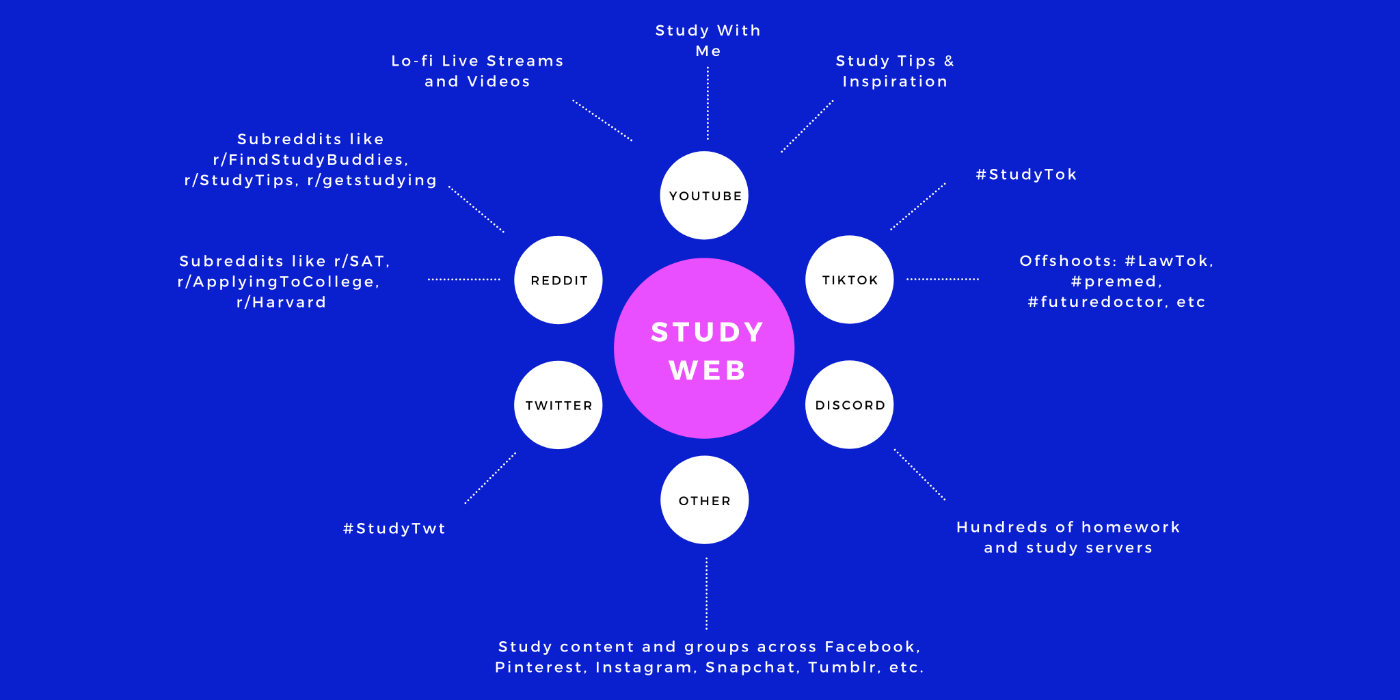
Welcome to another Friday edition of Cyberbits!
Cyberbits is a weekly curated newsletter of fascinating finds on the internet, from random Reddit threads to weird webpages. I also include interesting bytes I come across while working on longer Cybernaut essays. On Monday, I published a 5000+ word deep dive on Study Web, so this edition includes some bits I had to leave on the cutting room floor. I send this out each week!
This is the free version of Cybernaut! If you enjoy long-form essays (that take weeks to research and write!), consider upgrading to the premium version to support more of them.
In Case You Missed It
Caught in the Study Web —This week, I published a piece on Study Web; a vast online architecture of interconnected platforms where students from around the world are seeking out inspiration and accountability.
It includes Discord servers with over 100K members, Study With Me videos on YouTube and Twitch where thousands tune in at once, and #StudyTok, a subset of TikTok with over 680M views and its own academic influencers!
Populated by Gen Z and the youngest of millennials, it’s a colorful online space that’s filled with students aiming for A’s while battling the anxiety and anguish that comes with growing up in turbulent times and the pressurized-push for academic success. Study Web has largely been crafted for students by students, allowing them intermittent escape to commiserate on the stress of tests and the anxiety that comes with achievement. These online spaces are a digital campus where students gather together in the comments of live streams or in screen-share rooms in Discord servers. Study Web allows young people to escape the irl world that’s failing them in more ways than one.
This week, I’ve included a few bits exploring the creator side of being online in the Study Web, as well as pieces on the online spaces frequented by teens—in the Internet Graveyard as well as now.
Internet Nostalgia
Back in 2014, when Tumblr was at its peak, there was a particularly popular genre of microblog focused on studying: Studyblr.
Studyblr bloggers shared photos of aesthetic study setups, gave advice on the best methods for note-taking, and responded to popular #studyblr tags answering questions about their favorite school subjects and stationary preferences.
One of the best articles documenting the Studyblr phenomenon describes this nerdily aspirational corner of Tumblr as a “beautiful, stressful wonderland”:
“On the surface, study blogging looks like any teacher or parent’s dream—teenagers spending their time online talking about homework! But it takes hours and hours of work to make homework look pretty enough for the internet, particularly for this visually picky crew. Scrolling through the #studyblr tag, it’s beautiful, but the enviable precision and organization can stress you out. Looking at study blogs and reading about study tips doesn’t necessarily mean you ever get around to logging off and studying.”
Aside from the acute stress of the academic pressure to succeed, keeping up with the specific #Studyblr aesthetic was stressful in itself—both for those following Studyblrs and those creating them. One blogger, cited in the same piece, describes the weight of running a Studyblr:
"I’m a teenager and I care more about likes and followers than I’d care to admit, and sometimes I get really stressed out as I feel pressured to maintain a certain aesthetic and a certain facade.”
Like Tumblr itself, Studyblrs have waned in popularity. Some are still around, extending their presence to YouTube or Instagram, while others are now dormant, abandoned years ago. Interestingly, study content is something creators “age out of” as they go on to graduate and set their sights on the world of work.
But new crops of students continue to flock online, creating study content on platforms like YouTube, TikTok, Twitter, Discord, and Instagram. My piece this week focuses more on online study spaces and the students who inhabit them and less on the creators who make up the constellation of study content and community. Many balance dual-roles as creator-students. It’s unlikely that they’re any less stressed than the Studyblr creators that came before them. Whether you’re a health and fitness vlogger, a TikToker lip syncing to the latest popular sound, or a creator navigating Study Web, there’s a specific pressure that comes with living (or crafting) your life in front of an audience.
Check Out This Stuff
how I studied for 12 hours a day for over a year — James Scholz, one of Study Web’s most interesting and aspirational creators is known for his frequently uploaded 12-hour long Study With Me videos. It took him five months of regular uploads to reach 1,000 subscribers. Today he has over 337K and a giant Discord community. In a video describing how he’s maintained such a gruelling study schedule, he describes his discovery of the “growth mindset” and provides advice for others who want to maintain a similar work ethic—from the importance of proper posture and physical health to the value of prioritizing depth over length. It's an emotional video where he speaks about being pushed hard by COVID, school, and personal family problems.
things that frustrate me abt the study community 🍵 — Seo, the 19-year old student creator behind tbhstudying, shares her qualms with the online study community and wrestles with her own part in perpetuating the problems she abhors. She cites problems like the drive to be constantly productive, railing against the quote ‘we all have the same 24 hours in a day,’ and the lack of sensitivity the community has shown in the face of a stressful (to say the least) global pandemic. She also mentions the bend towards consumerism that includes affiliate links, product placement, and sponsorships. She calls out educational elitism and the emphasis on schools like Harvard and Yale at the omission of vocational schools, public education, and community colleges. Most interestingly, and perhaps most controversially, she brings attention to the exclusion and eurocentrism of a particularly popular Studyblr aesthetic: dark academia.
#OnlineSchool on TikTok — In my Study Web piece, I cover the #StudyTok tag on TikTok as well as offshoots like #premed, #lawtok, and #futuredoctor, where student influencers and creators alike upload inspirational bytes of content. #OnlineSchool has been co-opted by creators who want to have their non-school content found, but there’s still a lot to observe—half-serious, half not—about today’s online school experience. Highlights include: attending school from bed; pretending your wi-fi is slow to avoid answering questions; “pranks” like kicking your teacher out of a Zoom Call; terrible essay advice (switch “in conclusion” to “to sum up everything that has been stated” to bolster word count); new school punishments like “Zoom detention.”
Please stop lying about grades...please. — Surprise! Much of the stress that permeates Study Web is about students holding themselves to high standards that often don’t reflect reality. In a Reddit thread from six months ago, a professor at McMaster University in Ontario frequenting the school’s Subreddit calls out students lying about their grades, citing the truth about academic achievement:
“I'm a prof at Mac (I posted a few months ago to explain what things were like on our side of things) and I've been checking in the last few days to see how everyone was doing. The answer, evidently, is ‘not good.’ I feel for all of you people and I'm really glad they extended the break. It won't solve everything, but it'll help. Here's something else that will help though: stop lying about grades. I sit on various committees at the university and I literally see hundreds of transcripts per year. All of this talk about 11s and 12s is, frankly speaking, bullshit. The overwhelming majority of students on campus (like 95-99%) usually get grades in the 4-9 range. When people post about ‘easy 12s,’ it's (a) usually a lie, and (b) damaging to other people.”
Dive In
Fresh Content
The influencers are burned out, too — Whether you call it “burnout” or “languishing” everyone from journalists to wage workers continues to be stretched beyond their limits. And the excellent Rebecca Jennings adds anxious, metrics-obsessed influencers to that list:
“Whether they have 100,000 followers or a few million, all the TikTokers know that their fame will likely fade unless they work very, very hard to cultivate themselves into something solidly monetizable. They seamlessly toggle between their two identities — the real person and the online persona — and speak with a kind of cynicism about tying their livelihoods to a platform that could disappear in an instant. It all feels like stuff they shouldn’t have to think about, not yet.”
Internet Article Archive
The Secret Lives of Tumblr Teens (2016) - One of my all-time favorite explorations of teen life online is Elspeth Reeve’s incredible exposé into the Tumblr creators crafting “relatable” content netting them nearly $55,000 a month before it all came crashing down:
"Tumblr is the social network that, based on my reporting, is seen by teens as the most uncool. A telling post from 2014: 'I picked joining Tumblr and staying active on here because: 1. I’m not attractive enough to be a Youtuber 2. Not popular enough for twitter 3. Facebook is dumb.' You don’t tell people your Tumblr URL, you aren’t logging the banalities of your day—you aren’t even you. On Tumblr, you can revel in anonymity, say whatever you want without fear of it going on your permanent record. You can start as many Tumblrs as you like, one for each slice of your personality…"
If you’re a current (or former!) student who hung out on any part of Study Web, I’d love to hear from you! Did being in these online spaces focused on academic excellence help or hurt? :)
Have a lovely weekend,
Fadeke
P.S. Aside from access to long-form essays and Friday Cyberbits, a paid subscription to this newsletter gets you access to the entire Every bundle of newsletters and podcasts, including Glassy, Means of Creation, and many more!
You’ll also get access to our growing Discord community where we co-work, host writing workshops, and get explainers from experts on everything from the Getting Things Done methodology to decentralized finance.
The Only Subscription
You Need to
Stay at the
Edge of AI
The essential toolkit for those shaping the future
"This might be the best value you
can get from an AI subscription."
- Jay S.
Join 100,000+ leaders, builders, and innovators

Email address
Already have an account? Sign in
What is included in a subscription?
Daily insights from AI pioneers + early access to powerful AI tools


.png)







Comments
Don't have an account? Sign up!